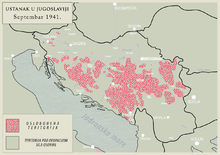Operation Uzice
[2] The uprising was successful and secured a defensible, self-sustained, independent region, the first of many "free territories" to be established by the Partisans during the course of the war, and was commonly called the "Užice Republic".Because of this, and since no reinforcements could be expected, the German authorities decided to rely on enlarging Serbian auxiliary forces in order for the "Serbs themselves to crush the communist activity".[5] By September 1941, after seeing the considerable success of the uprising, and observing its wide, and growing, support among the populace, the Chetniks realized that if they did not join the fight, they would likely forfeit their standing as the leaders of Serbian resistance.[7] A few days later on September 19, Tito met with Draža Mihailović in order to negotiate an alliance between Partisans and Chetniks, but they failed to reach an agreement.Tito was in favor of a joint full-scale offensive, while Mihailović considered a general uprising to be premature and dangerous, as he deemed it would trigger reprisals.[9] Invested by Hitler with total authority and told to "restore order for the longer term in the entire area by the most radical means", Böhme made it clear from the beginning that he intended if necessary to wage war against the whole Serbian population by considering all civilians as enemies.[13] Tito and Mihailović met again on October 26 or 27, 1941 in the town of Brajići near Ravna Gora in a final attempt to achieve an understanding, but found consensus only on secondary issues.[16] After more than a month of disagreements and minor collisions, the events culminated on November 1 in a massed Chetnik attack in and around the town of Užice where the Partisans had their headquarters.[17] Both Tito and Mihailović, however, were still willing to reach a truce, although both were pressed by some of their officers to attack the other as soon as possible; ceasefires alternated with ultimatums, as bloody reprisals between the two resistance movements affected both sides' morals and alienated civilians.There are indications that Mihailović offered to cease activities in the towns and along the major communication lines, but ultimately no agreement was reached at the time due to German demands for the complete surrender of the Chetniks.Tito had been surprised by the scale of the uprising, and had found himself managing inexperienced peasant fighters who were reluctant to move away from their towns, or to accept authority and indoctrination.

World War II in YugoslaviaYugoslaviaBosnianSerbianPartisanRepublic of UžiceChetnikGermanyGovernment of National SalvationIndependent State of CroatiaYugoslav PartisansChetniksFranz BöhmeDraža MihailovićJosip Broz Tito113th Infantry Division (Wehrmacht)342nd Infantry Division (Wehrmacht)704th Infantry Division714th Infantry Division717th Infantry Division718th Infantry Division100th Panzer BrigadeSerbian Volunteer CorpsAxis invasionBombing of BelgradeBombing of SarajevoSanski MostEastern HerzegovinaDrvar uprisingRogaticaSrb uprisingUprising in SerbiaBela CrkvaLoznicaBanja KoviljačaŠabacKruševacMačvaKraljevoTrešnjicaNovi PazarMihailovicSjenicaUprising in MontenegroBullseyePljevljaDražgošeSoutheast CroatiaPrijedorChetnik sabotage of Axis communication linesMontenegroKozaraPartisan Long MarchKupresKopaonikBihaćCase WhiteGreenwood–RoothamFungusHoathley 1Case BlackTypicalZvornikDavidsonGrčariceTurjak CastleMacleanVišegradBombing of PodgoricaBombing of ZadarDelphinRogersKugelblitzKočevjeRaid on MljetRaid on ŠoltaLindsayRösselsprungAndrijevicaHalyardOžbaltRatweekSerbiaBelgradeStracin–KumanovoVukov KlanacBregalnitsa–StrumicaKosovoSyrmian FrontNiš airspace incidentBatinaDesivojcaTrnovoMostarBombing of ZagrebSpring AwakeningTransdanubian HillsLika-PrimorjeNagykanizsa-KörmendSarajevoLijevče FieldTriesteZelengoraPoljanaOdžakAxis occupation of SerbiaHungarian occupationKosovo during World War IIWorld War II in the Slovene LandsWorld War II in Yugoslav MacedoniaAir warfare in YugoslaviaAllied bombing campaignGermanWehrmachtKingdom of YugoslaviaWorld War IIUžice RepublicUžiceSerbo-Croatian LatinYugoslavianpuppet regimeMilan NedićPožegaPartisansKrupanjŽikica Jovanović Španac